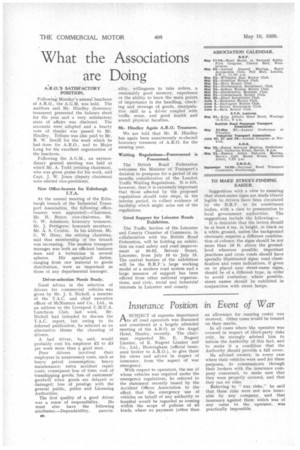What the Associations are Doing
Page 40

If you've noticed an error in this article please click here to report it so we can fix it.
A.R.O. 'S SATISFACTORY POSITION.
Following Monday's annual luncheon of A.R.O., the A.G.M. was held. The auditors and Mr. Hindley (honorary treasurer) presented the balance sheet for the year and a very satisfactory state of affairs was disclosed. The accounts were adopted and a hearty vote of thanks was passed to Mr. Hindley. Tribute was also paid to Mr. R. W. Sewill for the work which he had done for A.R.O., and to Major Long for his excellent organization of the luncheon.
Following the A.G.M., an extraordinary general meeting was held at which Mr. A. Todd (retiring chairman), who was given praise for his work, and Capt. J. W. Jones (deputy chairman) were elected vice-presidents.
New Office-bearers for Edinburgh I.T.A.
At the annual meeting of the Edinburgh branch of the Industrial Transport Association, the following officebearers were appointed:—Chairman, Mr. H. Bryce; vice-chairman, Mr. G. W. Adamson; honorary treasurer, Mr. J. Pettigrew; honorary secretary, Mr. A. S. Crosbie. In his address, Mr. G. W. Hoey, the retiring chairman, said that membership of the branch was increasing. The modern transport manager was both an efficient business man. and a technician in several spheres. His specialized duties, -ranging from raw material to goods distribution, were as important as those of any departmental manager.
Driver-selection Needs Study.
Good advice in the selection of drivers for commercial vehicles was given by Mr. J. S. Nicholl, a member of the T.A.C. and chief executive officer of McNamara and Co., Ltd., in an address to the Liverpool C.M.U.A. Luncheon Club, last week. Mr. Nicholl had intended to discuss the T.A.C. report, but owing to its deferred publication, he selected as an alternative theme the choosing of drivers, A bad driver, he said, would probably cost his employer £2 to £3 per week more than a good man.
Poor drivers involved their employers in unnecessary costs, such as heavy petrol consumption; heavy maintenance; extra accident repair costs; consequent loss of time; cost of transhipping goods; loss of customers' goodwill when goods are delayed or damaged; loss of prestige with the general public, police and Licensing Authorities.
The first quality of a good driver
was a sense of responsibility. He must also have the following attributes:—Dependability. punctu.
ality, willingness to take orders, a reasonably good memory, experience or the ability to learn the main points of importance in the handling, checking and stowage of goods, manipulative skill as a driver coupled with traffic sense, and good health and sound physical faculties.
Mr. Hindley Again A.R.O. Treasurer.
We are told that Mr. R. Hindley has again been unanimously re-elected honorary treasurer of A.R.O. for the ensuing year.
Waiting Regulations—Forewarned is Forearmed.
The British Road Federation welcomes the Minister of Transport's decision to postpone for a period of six months consideration of the London Traffic Waiting Regulations. It is felt, however, that it is extremely important that those affected by the proposed regulations should take steps, in the interim period, to collect evidence of hardship which might arise out of the regulations.
Good Support for Leicester Roads Exhibition.
The Traffic Section of the Leicester and County Chamber of Commerce, in collaboration with the British Road Federation, will be holding an exhibition on road safety and road improvement at 50-52, Belvoir Street, Leicester, from July 10 to July 15. The central feature of the exhibition will be the B.R.F.'s large working model of a modern road system and a large measure of support has been offered from other national organizations, and civic, social and industrial interests in Leicester and county. TO MAKE STREET-FINDING EASIER.
Suggestions with a view to ensuring that street-name signs are made clearly legible to drivers have been circulated by the B.R.F. to its constituent bodies, with a view to presentation to local government authorities. The suggestions include the following:— It is desirable that the letters should be at least 4 ins, in height, in black on a white ground, unless the background obviously requires a different combination of colours; the signs should be not more than 10 ft. above the groundlevel wherever possible; important junctions and cross roads should have specially illuminated signs; road classification and route indications, if given on or placed near street-name signs, should be of a different type, in order to avoid confusion; where possible, street names should be exhibited in conjunction with street lamps.




















































































